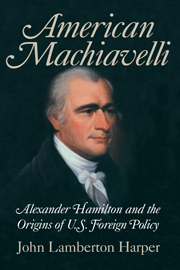Book contents
- Frontmatter
- Contents
- List of Illustrations
- Acknowledgments
- Miscellaneous Frontmatter
- Introduction
- PART I THE COMING OF NECESSITY
- PART II BATTLE LINES ARE DRAWN
- PART III SEIZING THE HELM
- PART IV INFORMAL ADVISER TO THE PRINCE
- PART V A PRINCE IN HIS OWN RIGHT?
- PART VI THE LESSER OF EVILS
- Conclusion: Hamilton Then and Now
- Notes
- Bibliography
- Index
Conclusion: Hamilton Then and Now
Published online by Cambridge University Press: 05 April 2013
- Frontmatter
- Contents
- List of Illustrations
- Acknowledgments
- Miscellaneous Frontmatter
- Introduction
- PART I THE COMING OF NECESSITY
- PART II BATTLE LINES ARE DRAWN
- PART III SEIZING THE HELM
- PART IV INFORMAL ADVISER TO THE PRINCE
- PART V A PRINCE IN HIS OWN RIGHT?
- PART VI THE LESSER OF EVILS
- Conclusion: Hamilton Then and Now
- Notes
- Bibliography
- Index
Summary
Hamilton’s fundamental teaching for his time and posterity is that the United States is (one would have said, “are” in his day, reflecting the reality of disunion) in and of the old, continental European world of power politics. Geography and national character offer no escape from the inexorable decree of human nature. As Machiavelli put it, “the nature of men is ambitious and suspicious.” It was Hamilton who wrote into Washington’s Farewell Address, the Sermon on the Mount of American statecraft, an explicit presumption of the “love of power, and proneness to abuse it, which predominates in the human heart.” In such a world, there is no choice but “to molest or be molested.” To think otherwise, to place one’s faith in Providence, “American exceptionalism,” or some other product of human fancy, rather than one’s own devices, is to lose one’s liberty and to deserve to lose it. For Hamilton, as for Machiavelli, “It was the test of a good political order to grow, to expand and to absorb other political societies, even to ward off decline for a while.”
To pass the test, organized societies must choose leaders and design institutions capable of bringing to bear virtù – that bundle of qualities including steadfastness, adaptability, boldness, guile, and dexterity at arms – in their relations with the external world. Institutionalized virtù does not guarantee survival or mastery of fortuna (contingency), but without it there is no hope. From Girolamo Savonarola to Thomas Jefferson, the moral authority of the “unarmed prophet” has never sufficed to protect the state. Just as Machiavelli looked for inspiration to the quasi-miraculous rise of the Roman republic, Hamilton looked for lessons in the experience of the most dynamic and remarkable generator of virtù in his day, the Britain of the elder and younger Pitts. Given the provincialism, and distrust of power, of the majority of his adopted countrymen, Hamilton’s program for creating a similar state in eighteenth-century America proved to be nearly as fabulous as Machiavelli’s vision for early sixteenth-century Italy. As in all great creative projects, there was an element of almost childlike idealism and naiveté in its breathtaking reach and scale.
- Type
- Chapter
- Information
- American MachiavelliAlexander Hamilton and the Origins of U.S. Foreign Policy, pp. 271 - 276Publisher: Cambridge University PressPrint publication year: 2004



